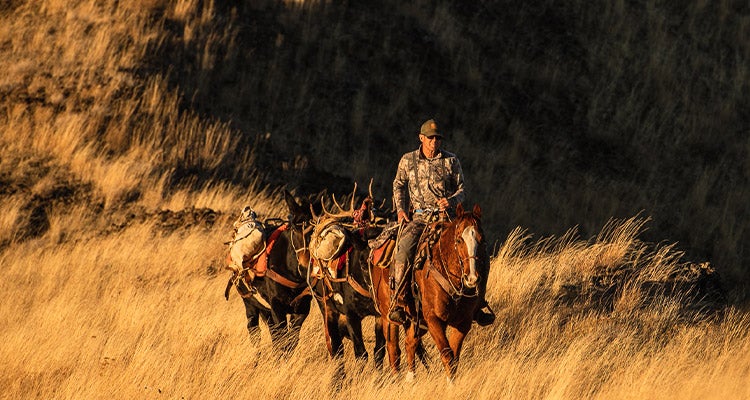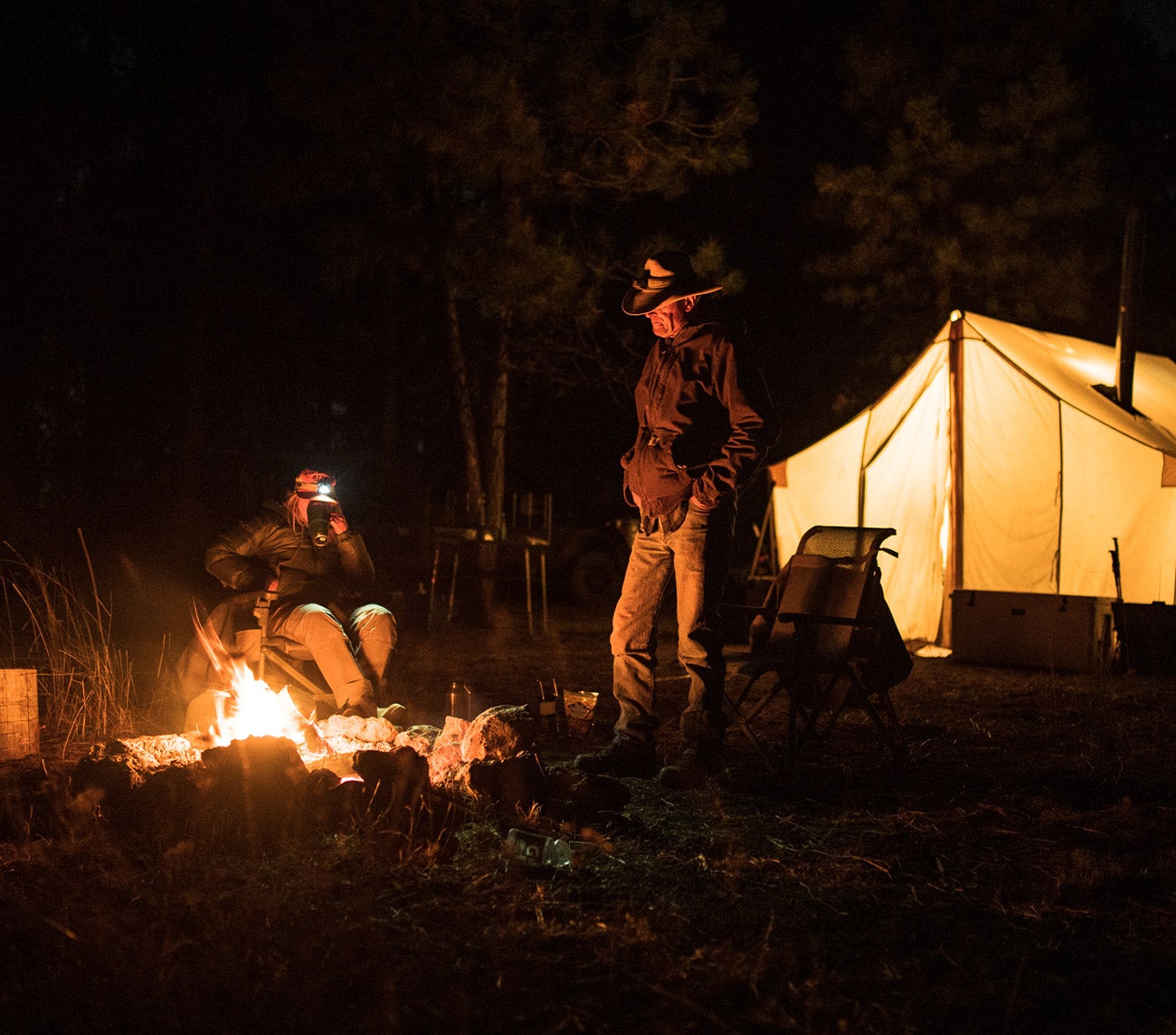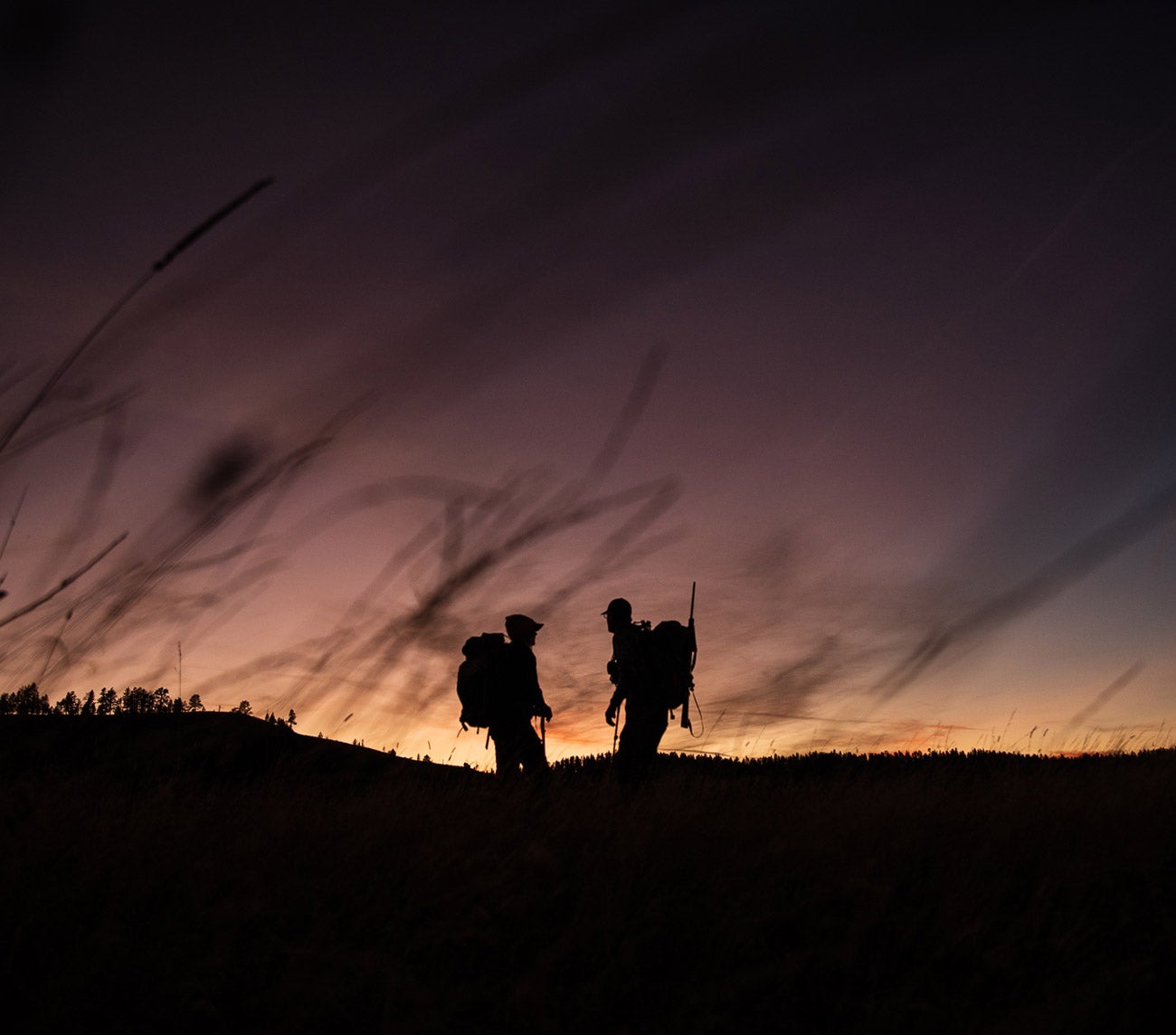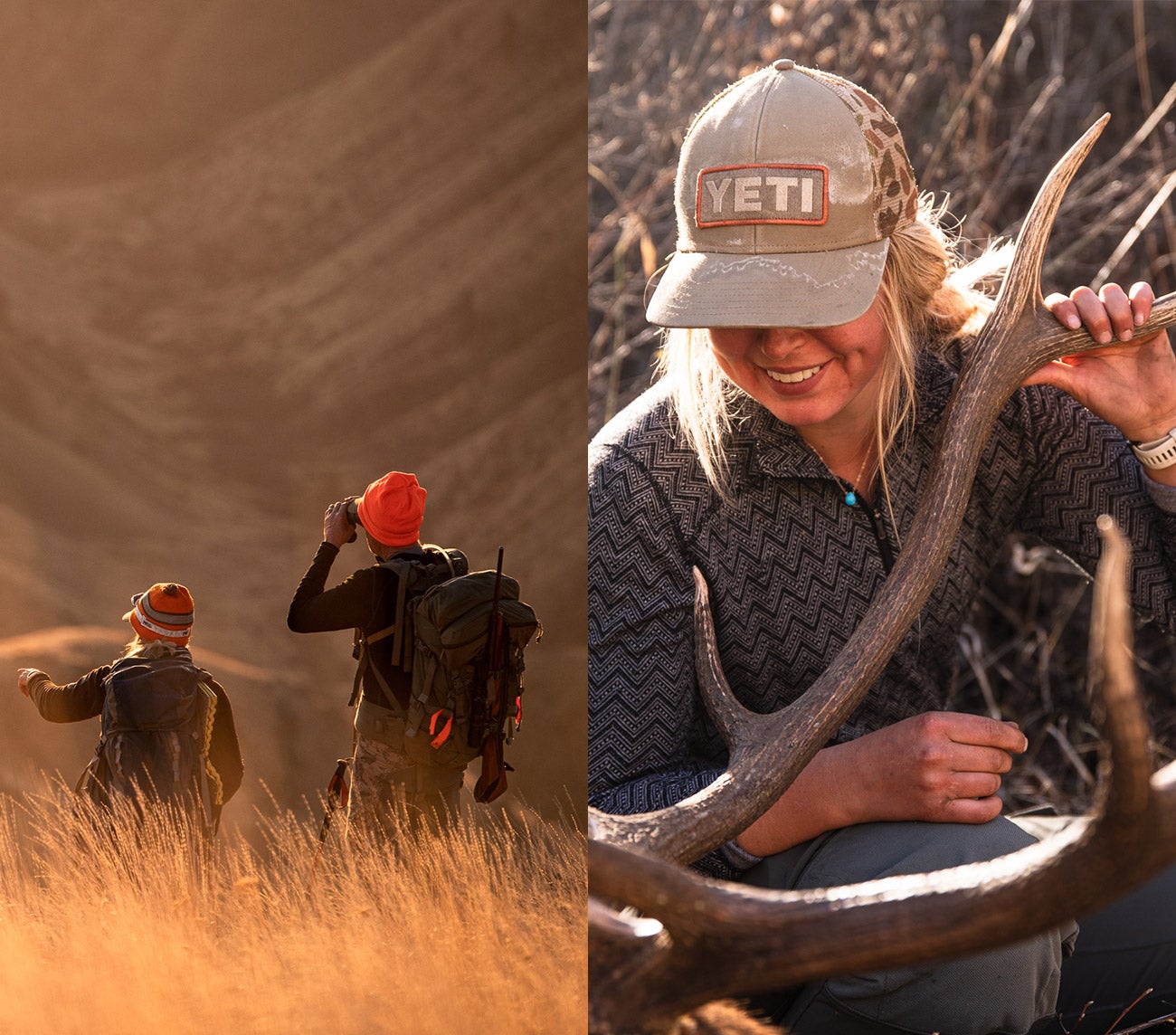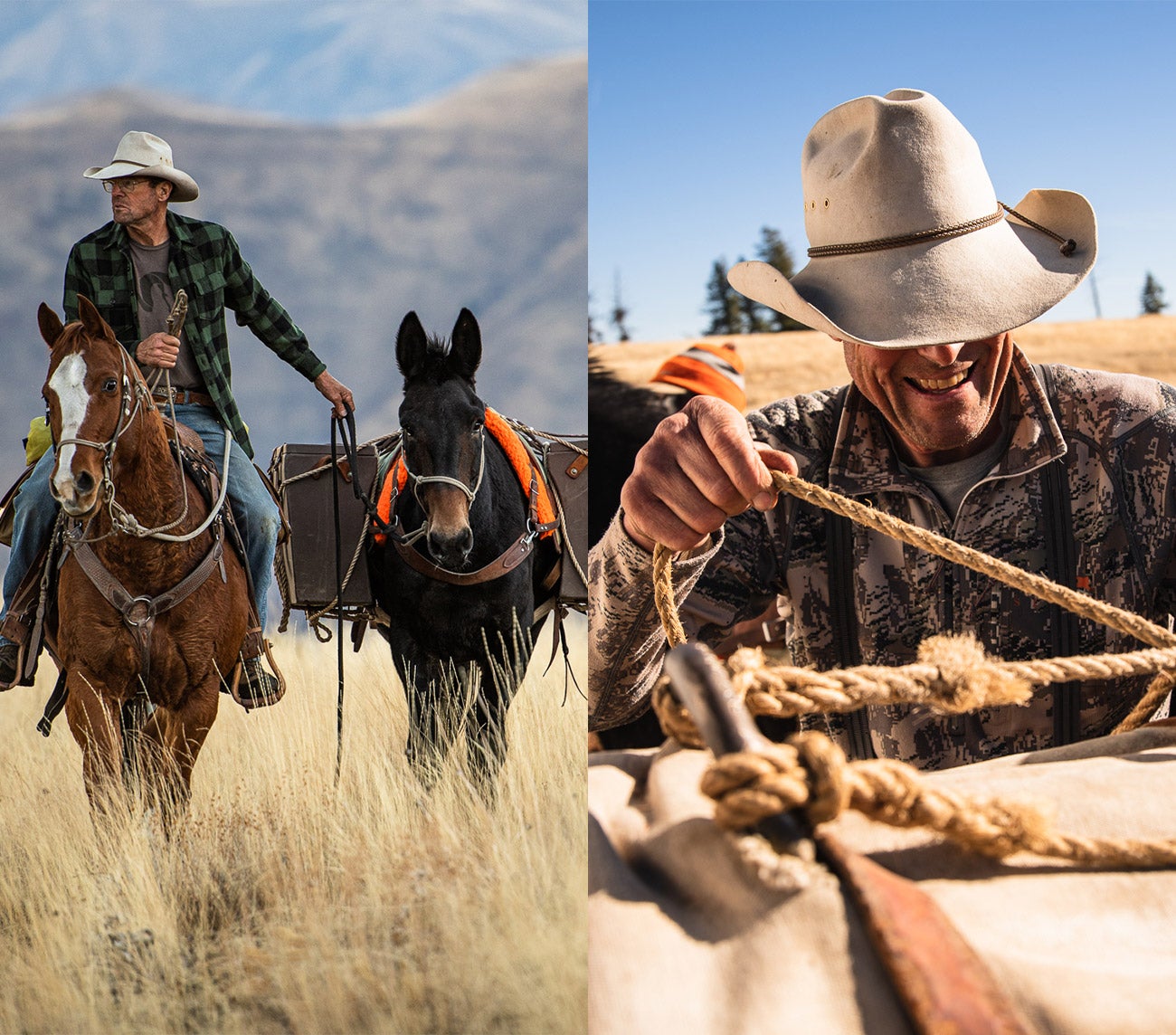Elk In The Twilight Years
Story By: Sam Averett
Location: Oregon
The stock shuffled quietly, hooves striking hollow on the frozen rocky ground. The panels of our makeshift corrals clinked metallic as horses and mules brushed against them in the dark. The wind had picked up in the late afternoon, and now gusts roared through the towering pines surrounding camp.
Inside, the canvas walls glowed yellow in the lantern light. The ancient wood stove nestled in the northeast corner of the tent groaned and exhaled. Occasional sparks escaped the wide-open draft, expiring on the damp ground beneath. Opposite the stove, a blue enamel coffee pot poured steam, simmering with the dregs of that day's cowboy coffee.
Dad lay on his cot in the corner furthest from the stove, headlamp glowing in the dingy light. His socked feet adjusted and the old cot creaked under him. He turned a page in his book, exhaled, and he lay the book on his chest.
“You know,” he started, “I really don’t care if I kill an elk Sam. Anymore, I guess I just like being here.” I glanced up from my book and studied him, “I know, Pops.” I stood and killed the propane lantern. In the last few years we’d been lucky to share a hunt together each fall - he always said the same thing.
As a boy, Dad and I hunted elk on the slopes of the towering mountain that loomed just off the back porch of our eastern Oregon home. One morning when I was eight, he woke me early. Bleary eyed, I pulled on boots and a hand-me-down camo jacket, then shuffled behind him through the dark. As the black of the morning faded to grey, ghostly shapes passed over the grassy meadow in front of us. Dad turned with a finger to his lips, then he stashed me at the base of a big, ancient pine tree and whispered to stay put. He hustled away into the soft morning light, and I waited, shaking from excitement. A half hour later his Ruger .270 cracked through the morning calm. He came back grinning; I was hooked.
Eventually, I started hunting with friends and making plans that didn’t include my dad. In those adolescent years planning a hunt with him was a burden I couldn’t be bothered to shoulder. I wanted to be out on my own or with friends. I wanted my own success, and my own failure – the latter I found in heaps. In those confusing years I flirted with ethics. Success meant an animal on the ground, I didn’t want the journey, I wanted the destination. I made mistakes and learned hard lessons, and the future never crossed my mind. I knew Dad and I would have plenty of time to hunt together someday down the line.
On a warm summer evening in 2017, my youthful illusion of infinite time was stripped away like a rug jerked from under me. In a bad-luck accident my mom was killed while doctoring cows on our ranch. In the weeks that followed I struggled to make sense of everything; I still do. But in the wake of all the bad, I stumbled on the realization that tomorrow isn’t promised, and ‘someday’ isn’t good enough. And so, under flickering streetlights in the hospital parking lot that night, Dad and I made a promise to spend more time together.
Late October of 2020 found us keeping that promise, joined by my sister, Kate. We left the truck and hustled down the trail in the dark, slipping and cursing on leftover snow and ice. Three miles in we slowed, binoculars working, searching for any sign of the bull I’d glimpsed the previous morning. By mid-morning we’d located his cows in the bottom of a rock-walled canyon, but he was gone, vanished into the labyrinth of cuts and coulees and timber and rock. We sat watching the cows 1500 vertical feet below us.
Dad studied the canyon from under his wire-rimmed glasses. “That’s a hell of a long way down. I think I’ll leave that to you if he shows up.” He lay back and tipped his hat forward over his eyes. Seconds later he was snoring. I glanced at Kate and we both laughed.
Kate and I hadn’t hunted much together, but lately she’d expressed interest and when dad and I began planning for this hunt, she wanted to come along. She was fresh off her first season on a hotshot crew in eastern Oregon and confident in her fitness for the rigors of this hunt. Selfishly, I knew she’d be a great help if we got an elk on the ground.
That afternoon we worked up the ridge as the sun dipped low in the west, stopping often to glass and talk. By dark we’d reached the flatbed Ford and Dad climbed behind the wheel. Horses and mules stomped in the headlights as we pulled into camp and killed the truck. Dad threw hay while I grabbed buckets and made for the pond behind camp, Kate heated dinner and started a fire.
For the next two days we hunted hard, rising early and staying late. We gulped tall mugs of yesterday’s coffee in the morning and sipped whiskey from the same mugs after dark. Dad fixed fresh apple crisp in his old camp dutch oven over the open campfire our third night out. We laughed and hiked and listened to old Ian Tyson songs in the tent well after the lantern burned out. We enjoyed each other’s company and tried not to overthink it all.
When the sun chased the shadows from the canyons on our fourth morning, we sat glassing new country. Far below and two miles distant a lone bull meandered up the wide canyon bottom, cropping grass and moving methodically. The yellow sun shone bright on his antlers. He crossed the bone-dry creek bed and ambled out of sight into a slot canyon on the south side of the drainage.
“Perfect,” I thought. “What do you think Pops? Wanna go after him?”
Dad’s broken, weathered hands moved over the paper Forest Service map, gold wedding band gleaming in the new day sun. His cracked fingers settled where the bull had disappeared and he looked up.
“Shit Sam. That’s a heck of a long way from here, and we’re already a damned long way from camp,” he confessed. “And when that mare caught my knee the other day I think she kinda screwed it up.”
I’d noticed as he limped down the ridge that morning. He’d stopped and shook three Ibuprofen from their plastic bottle, then kept on. He was hurting.
“Why don’t you guys go?” he offered. “You and Kate.”
“Well I don’t care, Pops. I’d rather you killed him,” I argued.
“If I make it down there,” Dad chuckled, “I don’t know that I’ll make it back up. I’ll stay here, and when I hear you shoot I’ll start working back to camp and have supper ready. Tomorrow we’ll bring the horses down this ridge as far as we can and get the meat.”
Kate was champing at the bit, stuffing extra layers and energy bar wrappers into her backpack, guzzling water. “Let’s go,” she said curtly as she shouldered her pack and buckled the waist belt. “I ran out of elk steak a month ago.”
Dad bid us luck and we turned downhill, sliding and falling down the loose, shale grade into the canyon bottom, overgrown and intertwined. Everything stabbed and stuck as we fought through brush toward the bull. Kate’s arms were bleeding from a hundred tiny cuts.
My mind flashed back to that first elk hunt with Dad twenty years ago. This time it’s he who waits beneath the pine while I rushed headlong into the lightening day. I pulled my thoughts back to the task at hand.
Physically, I guess he hadn’t been there, but it mattered none. He knew the sweet smell of red blood on calloused hands and the back-breaking work of butchering. We stayed up late, bellies full, savoring the last of the whiskey in our coffee-stained cups.
We halved the distance to the bull, then halved it again; I guessed we were within 300 yards now. A sweltering summer and arid fall had left the grass dead and dry, which meant we were too loud. We paused and I worked a shell into the chamber of the rifle.
“What do you think?” I whispered. “Wanna try to kill this bull?”
“I mean, hell yeah. We’re already down here,” she answered.
“Alright, when we pop over this ridge he could be bedded anywhere. It’s probably gonna happen fast and close,” I handed her my binoculars.
We slipped out of the hedgerow-thick bottom and up a game trail onto the ridge, selecting our footfalls. An almost imperceptible breeze touched my uphill cheek and I scanned the brush at our 12 o’clock. Nothing. Another step. Look. Look again. He has to be right here. Another step. Look. We crept from the last of our cover and into the open. I glanced down at the rifle. Scan. Nothing. Step.
“There!” Kate hoarsed through parched lips as the bull scrambled from his midmorning bed breaking from cover in a great mass of tawny hide and smashing limbs.
I mewed loud on the reed cemented to the roof of my mouth and hit the ground. The bull stopped and stood. The crosshairs danced behind his shoulder but then he was moving again, hooves clattering for purchase over rock and scree. I mewed again and he slowed, antlers and eyes swiveling to study us. My ears flooded with tinny ringing as the shot broke, bullet striking home just 100 yards from the muzzle.
The bull lifted his shoulder and pressed forward, loping. The bolt clicked open and back, forward and down, and I looked through the scope as the bull sidestepped and then lost his footing altogether. Crashing earthward in a cloud of fine dust as utter stillness reclaimed the canyon.
I glanced up at Kate, “We just killed an elk.”
The bull lay motionless in a twisted patch of brush. Kate knelt and brushed his hide, then stood and freed his antlers from the branches and stepped back, hands on hips.
“Damn. He’s big,” she mumbled.
We set to work and quartered the bull where he lay, separating meat from hide and bone and laying pieces in the shade. Hours later I stood and wiped my knife on the leftover hide and sheathed it. Long afternoon shadows had marched slowly over all this rough ground. Where had the day gone?
Kate hoisted a crimson bag and set it in her backpack.
“That’s gotta be 50 pounds,” I protested.
“It’s not even that heavy,” she shouldered the pack. “I’ll be fine.”
And, toiling up and out of our 3,000 foot hole, she was. We stashed the meat at the crest of the ridge beneath a stunted ponderosa. Tomorrow we’d make one more trip.
Smoke poured skyward from the stovepipe of the wall tent into the stars above. Pots and pans clinked inside and even from a distance we could see Dad's shadow upon the tent wall. Ponies nickered softly as we ambled stiffly past, smelling blood. Dad tossed open the tent flap, grinning.
Kate recounted the story, and Dad listened knowingly. Physically, I guess he hadn’t been there, but it mattered none. In his mind's eye he could see the stalk, the bull, and the shot. He knew the sweet smell of red blood on calloused hands and the back-breaking work of butchering. He knew the details just as we knew them. Probably, I thought, he knew them better.
We stayed up late, bellies full, savoring the last of the whiskey in our coffee-stained cups.
In the morning we ate quickly, and when the second pot of coffee was finished, Kate and I set out to retrieve our stashed meat.
-----
In the 80’s, dad had guided elk hunters in Idaho’s famed Frank Church River of No Return Wilderness. It’s where he’d taken to horses and pack animals. At the same time, a world away, my mom was on horseback, too, navigating Seattle’s concrete and steel jungle in the mounted patrol division with Seattle Police Department.
When they married, they’d taken up Working Cow Horse competitions and continued to ride on the ranch at our home. Around our house, it was well-known that Mom’s horse was a good bit better than Dad’s. She consistently placed in competitions with her horse, Garfield.
It’s Garfield that my dad now rides through the mountains and canyons and down to where my sister and I are packing our elk. I could see four animals and one rider working down toward us. Dad stood in the saddle and turned, right hand gripping the cantle as he leaned out, craning his neck to check the lead ropes and empty panniers on the other horses, Moose and Midge. His felt hat, stained with sweat and dust from bygone miles and years, cast a shadow long over his face.
Eventually he reached us and swung down.
“Long walk?” he asked, chuckling to himself.
Without waiting for an answer, he turned toward the animals, jerked the piggin’ string and loosed the mules and handed them to Kate. I yarded the game bags over to him and he set the hook in the cloth and hoisted them up one by one. Dad evened the bags and loaded one in each box. Then he laid out two canvas manties and parceled the remaining game bags evenly between them.
Satisfied, he folded the corners to center and wrapped the remaining canvas into itself, then looped the manty rope around the entire bundle, wrapped it several times and tied off the end and half-hitched it. He slid these carefully into the panniers and together we hoisted them up and over Midge’s back. He loosed the lash ropes from the D-rings and looped them beneath and around the panniers, secured them and tucked in the ends. I noted his deftness and care, wishing I’d paid better attention in my early years, but grateful to still study his work.
We sat down in the evening quiet. Listening to the animals adjusting to the new weight of their loads, watching the last of the light fade from the endless western sky. My thoughts wandered to how it was that we’d come to be together here on this knife ridge with horses and bloody clothes and sweaty brows and smiles creasing our lips.
Dad stood up, appraising the animals and their loads.
“If your mother knew I was dragging her good horse around in this country packing elk, I think she’d come unglued,” he said softly.
I didn’t know what to say.
He stuck his foot in the stirrup and swung up. Looking back, he touched his heels to the mare. Leather creaked and groaned and the string lurched forward into the gathering dusk.
I stood, cemented in place, watching as he worked away up the ridge. And I felt somehow that I was witnessing the completion of something. That the moment was a memory from a time already long gone. I saw the moment like a grainy snapshot in a dust-covered photo album. I was already reminiscing. It was at once both beautiful and crushingly finite; it couldn’t be one without the other. The final piece in a puzzle, set in motion long before I’d joined the world. I felt a deep sadness. I felt an even deeper gratitude.
Dad crested the ridge and stood his horse and looked back, silhouette dark against the clear sky. A minute passed, then he turned and dropped out of sight behind the ridge, dust settling in the yellow of the setting sun. I shouldered my empty backpack and hustled to catch up.
-----
